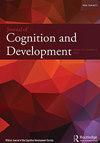通过科学的故事书阅读提高孩子的毅力
IF 1.6
2区 心理学
Q3 PSYCHOLOGY, DEVELOPMENTAL
引用次数: 7
摘要
摘要86名4岁和5岁的儿童被分配到四种条件中的一种,三种实验条件,即儿童阅读一位著名科学家的故事,以及一种基线条件。在成就条件下:这位科学家被描述为一生都在接受奖励和认可,没有讨论挫折;在《智力斗争》中,科学家被描述为在通往成功的道路上犯错误;在《人生的奋斗》中,这本书强调了个人的奋斗,比如没有钱买食物。在基线条件下,孩子们在没有第一次阅读故事的情况下完成了一项持久性任务。在每种实验条件下,孩子们都被问了12个问题,这些问题改编自掌握维度问卷18,该问卷考察了他们在面对挑战性任务时的坚持性和动机。最后,向孩子们展示了坚持任务。分析表明,处于智力斗争和生活斗争状态的儿童比处于成就状态的儿童坚持任务的时间更长。这些发现表明,强调科学过程而不是仅仅关注成就的故事书会影响STEM中的持久性和关联感。本文章由计算机程序翻译,如有差异,请以英文原文为准。
Boosting Children’s Persistence through Scientific Storybook Reading
ABSTRACT Eighty-six 4- and 5-year-old children were assigned to one of four conditions, three experimental conditions, in which children read a story about a famous scientist, and one baseline condition. In the Achievement condition: the scientist was described as receiving awards and recognition through their lifetime, with no discussion of setbacks; in the Intellectual Struggles, the scientist was described as making mistakes along the way to success; and in the Life Struggles, the book emphasized personal struggles, such as having no money for food. In the Baseline condition, children completed a persistence task without having first read the story. In each experimental condition, children were asked 12 questions adapted from the Dimension of Mastery Questionnaire-18, which examined their persistence and motivation when faced with a challenging task. Finally, children were presented with the persistence task. Analyses revealed that children in the Intellectual Struggles and Life Struggles conditions persisted longer on the task than children in the Achievement Condition. These findings suggest that storybooks that emphasize the process of science, rather than solely focusing on achievement can impact persistence as well as feelings of relatedness in STEM.
求助全文
通过发布文献求助,成功后即可免费获取论文全文。
去求助
来源期刊

Journal of Cognition and Development
Multiple-
CiteScore
4.00
自引率
0.00%
发文量
29
期刊介绍:
The Journal of Cognition and Development is the official journal of the Cognitive Development Society (CDS). Some CDS members are concerned with basic research or theory; others focus on policy issues and practical applications. The range of interests includes cognitive development during all stages of life, and we seek to understand ontogenetic processes in both humans and nonhumans. Finally, their interests encompass typical as well as atypical development, and we attempt to characterize both biological and cultural influences on cognitive change and continuity.
 求助内容:
求助内容: 应助结果提醒方式:
应助结果提醒方式:


